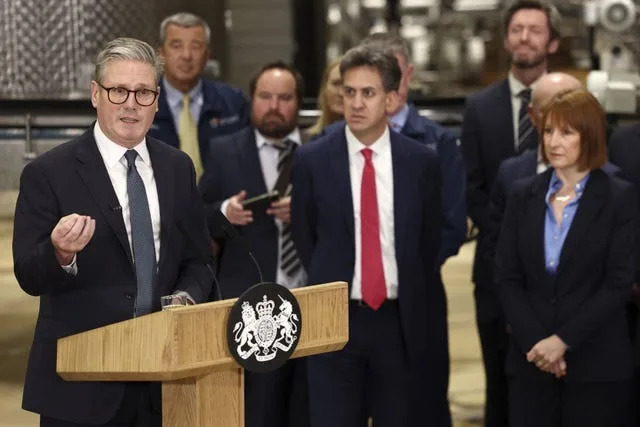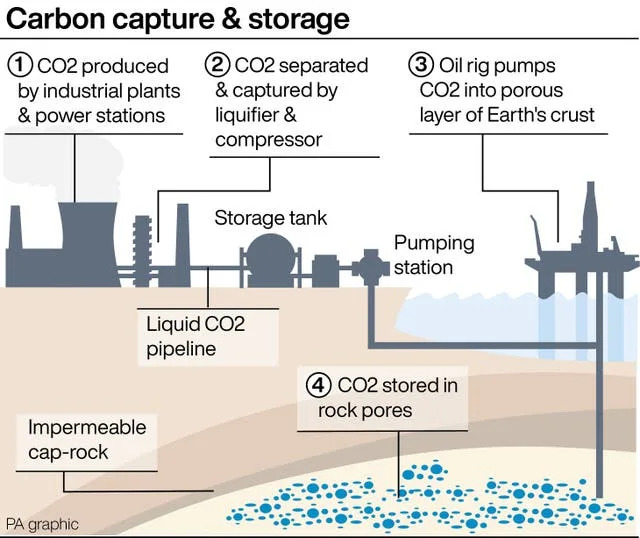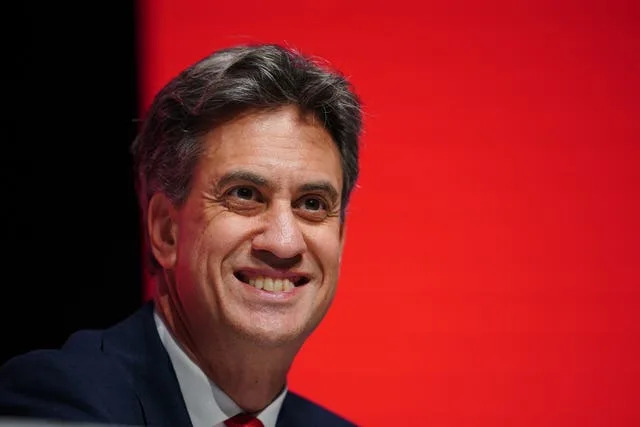UK Government pledges £22bn for carbon capture to boost growth and cut emissions
Emily Beament, PA
Fri, October 4, 2024
The Government has pledged nearly £22 billion funding to develop projects to capture and store carbon emissions from energy, industry and hydrogen production.
It is hoped the funding for two “carbon capture clusters” in Merseyside and Teesside, promised over the next 25 years, will create and support thousands of jobs, draw in private investment and help the UK meet climate goals.
Prime Minister Sir Keir Starmer claimed the move was “reigniting our industrial heartlands by investing in the industry of the future”, as he made the announcement with Chancellor Rachel Reeves and Energy Secretary Ed Miliband.
Carbon capture, utilisation and storage (CCUS) is a technology which captures the emissions from burning fuels for energy or from industrial processes such as cement production, and uses or transports them for storage permanently underground – for example, in disused oil fields under the sea.
It is seen by the likes of the International Energy Agency (IEA) and the Climate Change Committee as a key element in meeting targets to cut the greenhouse gases driving dangerous climate change.
It is also a key component in “blue” hydrogen, made from natural gas with the carbon emissions captured and stored to make it “low-carbon”, which can then be used as clean energy in power plants or industrial processes, although environmentalists warn blue hydrogen still requires a reliance on fossil fuels.
While it has long been championed as part of the solution – with Energy and Security and Net Zero Secretary Ed Miliband first announcing plans to develop carbon capture projects for power plants in 2009 during the last Labour government – and it uses well-tested technology, little progress has been made on it in the UK.
Funding of up to £21.7 billion over 25 years focuses on subsidies to three projects in Teesside and Merseyside, once they start capturing carbon from hydrogen, gas power, and energy from waste, to support the development of the clusters, including the infrastructure to transport and store carbon.
(PA Graphics)
The funding will also support the two transport and storage networks which will carry the carbon captured to deep geological storage in Liverpool Bay and the North Sea.
The Government said the move would give industry confidence to invest in the UK, attracting £8 billion of private investment, directly creating 4,000 jobs and supporting 50,000 in the long term.
It will also help remove 8.5 million tonnes of carbon emissions each year, officials said, with the first carbon dioxide being stored from 2028.
It aims to pave the way for the first large scale hydrogen production plant in the UK and helping the oil and gas industry transition to clean energy with a workforce that has transferable skills.
Secretary of State for Energy Security and Net Zero Ed Miliband kickstarted the scheme with the last Labour government in 2009 (Peter Byrne/PA)
The move has been welcomed by businesses involved in developing the two carbon capture clusters, which are focused on capture and storage of emissions from industrial, hydrogen and energy production.
Independent advisers the Climate Change Committee also welcomed the move, saying the commitment to the necessary technology was “very reassuring”. However, Greenpeace criticised the support for hydrogen from gas as putting the country at risk of “locking ourselves into second-rate solutions”.
Sir Keir said: “For the past 14 years, business has been second-guessing a dysfunctional government – which has set us back and caused an economic slump.
“Today’s announcement will give industry the certainty it needs – committing to 25 years of funding in this ground-breaking technology – to help deliver jobs, kickstart growth, and repair this country once and for all.”
Mr Miliband said: “By securing this investment, we pave the way for securing the clean energy revolution that will rebuild Britain’s industrial heartlands.
“I was proud to kickstart the industry in 2009, and I am even prouder today to turn it into reality.
“This funding is a testament to the power of an active Government working in partnership with businesses to deliver good jobs for our communities.”
And Ms Reeves, said: “This game-changing technology will bring 4,000 good jobs and billions of private investment into communities across Merseyside and Teesside, igniting growth in these industrial heartlands and powering up the rest of the country. ”
Emma Pinchbeck, chief executive of Energy UK described CCUS as a “tool in our armoury of technologies which we need to decarbonise parts of energy that we currently can’t do with clean electricity, such as major industrial processes”.
She said development of CCUS for industrial processes would unlock investment and help areas with a “proud history of engineering and industry pioneer the technologies of the future in the UK”.
And James Richardson, acting chief executive of the Climate Change Committee, said: “It’s fantastic to see funding coming through for these big projects.
“We can’t hit the country’s targets without CCUS so this commitment to it is very reassuring.
“It will no doubt provide comfort to investors and business about the direction of travel for the country.
And he said: “We know these projects will provide good, reliable jobs in communities that need them.
“It is important that prosperity for these parts of the country is built into a clean energy future.”
But Greenpeace UK’s policy director, Doug Parr, said £22 billion “is a lot of money to spend on something that is going to extend the life of planet-heating oil and gas production”.
While he acknowledged it was vital the Government commitment to industrial investment and job creation while tackling the climate crisis, “it needs to be the right sort of industries”.
“Carbon capture may be needed for hard to abate sectors, such as cement production; however, hydrogen derived from gas is not low-carbon and there is a risk of locking ourselves into second-rate solutions, especially as the oil industry could easily hoover up most of the money to continue business as usual.”
He called for the bulk of the money to be invested in creating new jobs in sectors such as offshore wind or rolling out a nationwide home insulation programme to cut bills.
The Tories accused Mr Miliband of overseeing a “mass deindustrialisation pathway”.
Shadow energy secretary Claire Coutinho said: “Exceptional local leaders like Ben Houchen have worked on this for years and it’s thanks to the Conservatives that funding was already announced for these projects in the Spring of 2023.
“But whilst this is undoubtedly good news for Carbon Capture jobs, this will not make up for the mass deindustrialisation pathway that Ed Miliband’s costly net zero and energy policies are leading us to, with the devastating impact of his zealotry on jobs already seen in steel-making, refineries and in the North Sea.”
Rhiannon James and Will Durrant, PA Political Staff
Mon, October 7, 2024
The Government has been criticised for spending billions on carbon capture and storage projects while it continues with its plans to means-test the winter fuel allowance.
Reform UK’s Richard Tice argued that millions of pensioners will view the decision to spend £22 billion on renewable energy as “absolutely extraordinary”.
Meanwhile, Tory former minister Andrew Murrison said the Chancellor’s decision to “magic” up money to fund the projects is surprising due to her recent focus on financial “black holes”.

Reform UK MP Richard Tice (Lucy North/PA)
This comes after Prime Minister Sir Keir Starmer announced the plans to develop projects to capture and store carbon emissions from energy, industry and hydrogen production at a glassmaking factory in Cheshire last week, alongside Energy Secretary Ed Miliband and Rachel Reeves.
On Monday, Mr Miliband told the Commons the use of carbon capture, utilisation and storage (CCUS) technology signifies a “new era” of Britain’s “energy journey”.
CCUS captures the emissions from burning fuels for energy or from industrial processes such as cement production, and uses or transports them for storage permanently underground – for example, in disused oil fields under the sea.
It is seen by the likes of the International Energy Agency (IEA) and the Climate Change Committee as a key element in meeting targets to cut the greenhouse gases driving climate change.
In a statement on the projects, Mr Miliband said: “This Government is determined that as we begin the next stage of Britain’s energy journey, we create a new generation of good jobs in our industrial heartlands.
“That is why on Friday we began a new era, as Government and industry agreed the deals that will launch Britain’s carbon capture industry. This has been a long time coming.”

Tory former minister Andrew Murrison (Jonathan Brady/PA)
Mr Murrison, MP for South West Wiltshire, said: “Given the Chancellor’s rhetoric about black holes, it’s perhaps a little surprising that the Government has managed to magic £22 billion for this, but I wish the Secretary of State well in his plan, I hope it works.
“Can I ask whether he shares my concerns that in doing this we’re going to reduce the drive to decarbonise industries? Just like the use of waste incinerators has reduced the imperative to reduce, reuse, and recycle waste.”
Mr Miliband replied: “This is a long-term investment in the future of the country and I think the Chancellor is farsighted in seeing the importance of it.
“On the second part of his question, there are hard to obey industries that are just going to find it very hard without carbon capture to enter a decarbonised world, and we’ve got to protect those industries for the future.”
Mr Tice, who represents Boston and Skegness, said: “Ten million pensioners will find it absolutely extraordinary that this Government has managed to find over £20 billion, when they can’t find £1 billion to fund the winter fuel allowance. £20 billion, Secretary of State, in what you’ve admitted today is a risky technology.”
He added: “This is almost £1,000 per household Secretary of State, will this sum of taxpayers money, will it be added to general taxation when taxes are already at record highs or will it be added to our energy bills that you’ve promised will be brought down?”
Mr Miliband responded: “Here we have the party that claims to be the party of working people opposing jobs for working people right across the country, it says all you need to know about (Mr Tice).
“Outside of this House he pretends to be in favour of good industrial jobs for Britain, in this House he opposes them.”
SNP brands UK Government ‘clueless’ over carbon capture decision
Craig Paton, PA Scotland Deputy Political Editor
Fri, October 4, 2024
The SNP has accused the UK Government of being “clueless” for favouring two carbon capture projects in England over one in Scotland.
Prime Minister Sir Keir Starmer has announced plans for two “carbon capture clusters” in Merseyside and Teesside, which will be developed over the next 25 years at a cost of almost £22 billion.
Carbon capture, utilisation and storage (CCUS) is a technology which captures the emissions from burning fuels for energy or from industrial processes such as cement production, and uses or transports them for storage permanently underground – for example, in disused oil fields under the sea.
But a proposed facility in St Fergus, near Peterhead in Aberdeenshire, has again been overlooked.
The Acorn project was given reserve status after being passed over for funding in 2021 by the previous UK government.
Attacking the latest decision – announced by Sir Keir, Chancellor Rachel Reeves and Energy Secretary Ed Miliband on Friday – SNP Westminster leader Stephen Flynn said: “This really isn’t that hard – if you want economic growth, if you want to create jobs, if you want to develop a domestic supply chain, and if you want to hit net zero, then you invest in the Acorn project.
“For years we’ve been waiting for the Tories to back this project and despite offering ‘change’, the Labour Government have followed the same path by prioritising projects in the North of England, offering the Scottish cluster no certainty at all.

Prime Minister Sir Keir Starmer, left, made the announcement alongside Ed Miliband and Rachel Reeves (Darren Staples/PA)
“We’ve seen with Grangemouth what happens when you don’t invest in the energy transition and, at this point, Labour look desperate to repeat those mistakes with their absurd tax changes and failure to invest in CCUS here in the north east.
“We know that Ed Miliband and the Labour Party have lofty ambitions for net zero but their clumsy and clueless approach to the north east indicates that they have no idea how to actually deliver on their aims.”
Meanwhile, the Scottish Greens described CCUS as “a costly and unproven technology”, adding it is no substitute for increased investment in renewables.
Co-leader Lorna Slater said: “The billions of pounds that Keir Starmer is pouring into CCUS would be much better spent on cutting people’s electricity bills, investing in green skills and proven industries and boosting energy efficiency and public transport.”
A UK government spokesperson said: “Scotland is at the forefront of the drive towards net zero and clean energy, with Great British Energy’s headquarters to be located in Aberdeen.
“Our historic funding is just the first step in developing a self-sustaining market for carbon capture, usage and storage.
“Acorn has already received over £40 million for development and it is our firm ambition to proceed with the projects in the Track-2 club


No comments:
Post a Comment